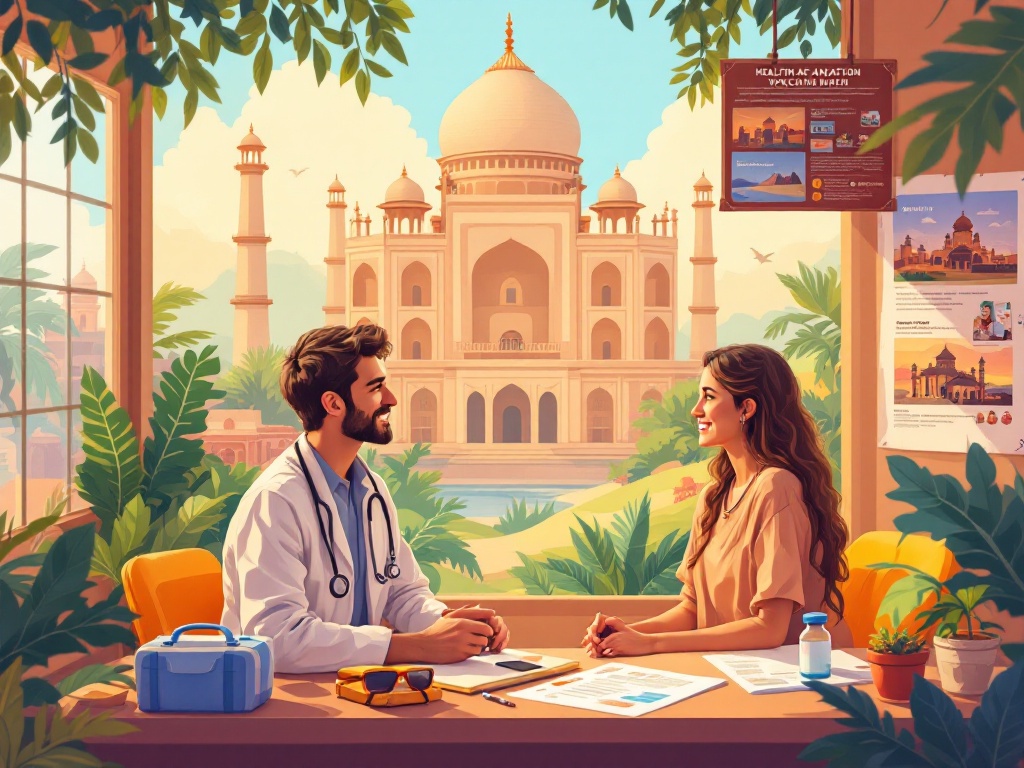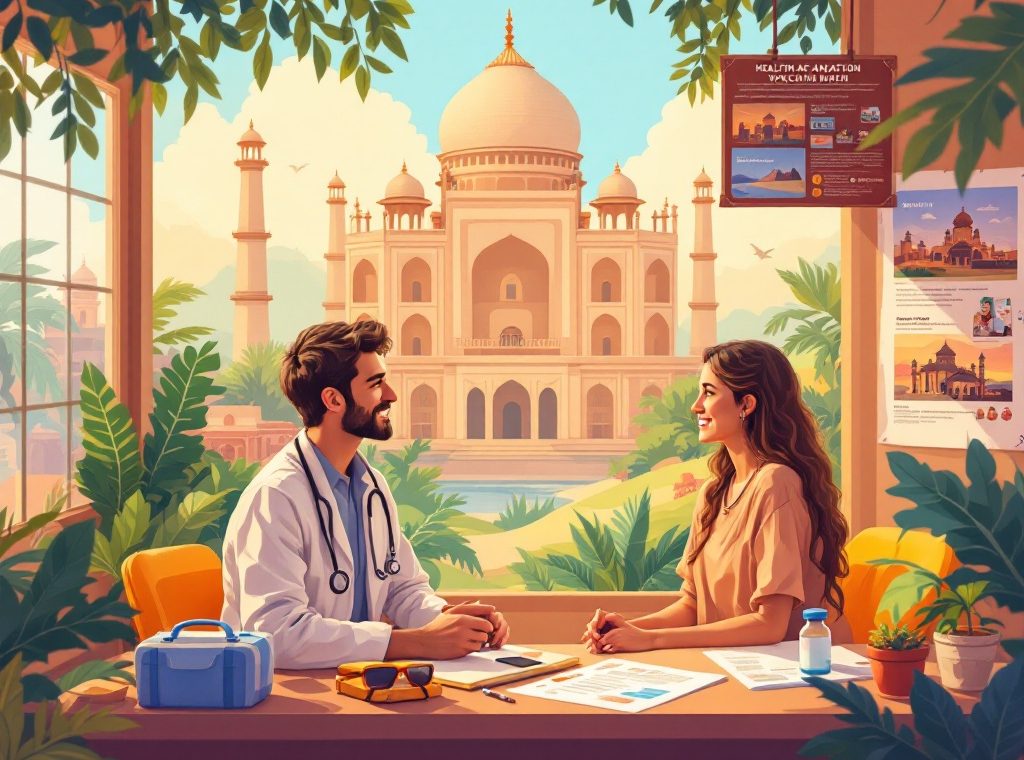Essential Vaccination for Travel to India
Dreaming of India’s vibrant culture and stunning landscapes? Ensure your trip is healthy and safe by preparing now with essential travel vaccinations. Protect yourself from diseases like Hepatitis A and B, Typhoid, and Tetanus-Diphtheria. Depending on your itinerary, especially rural travel, vaccines for Japanese Encephalitis and Rabies may be necessary. Consult your doctor 4-6 weeks before departure for personalized advice and a vaccination plan tailored to your trip. Safeguard your health and enjoy a worry-free Indian adventure. Start planning today!
Important information

- Consult your doctor 4-6 weeks before traveling to India to discuss personalized vaccination recommendations based on your itinerary and health.
- Recommended vaccinations for India often include Hepatitis A and B, Typhoid, and Tetanus-Diphtheria.
- For rural travel or extensive outdoor activities, consider Japanese Encephalitis and Rabies vaccines.
- Ensure your routine vaccinations (MMR, DTaP, polio, and influenza) are up-to-date before departure.
- Some vaccines require multiple doses or a longer schedule, so begin the vaccination process early for optimal protection.
Understanding Vaccination Requirements for Travel to India
Planning a trip to India? Careful preparation, especially regarding vaccinations, is essential. Discuss recommended vaccines and medicines with your doctor. Essential vaccinations often include Hepatitis A and B, Typhoid, and Tetanus-Diphtheria. Depending on your itinerary, additional precautions like Japanese Encephalitis and Rabies vaccines might be necessary. These are particularly important for rural travel or extensive outdoor activities. Your doctor can provide personalized advice based on your specific plans and risk factors.
What Vaccinations Are Needed for Travelers?
Planning a trip to India? It’s wise to get vaccinated beforehand. Consider these important vaccinations:
- Hepatitis A and B.
- Typhoid.
- Tetanus.
For travel to rural areas, also consider the Japanese Encephalitis vaccine. If you anticipate close contact with animals, the rabies vaccine is recommended. For personalized advice, consult your doctor. They can assess your health and travel plans to tailor recommendations specifically for you.
Why Visit a Doctor Before Traveling?
A pre-travel doctor’s visit is essential for a safe and healthy trip. It allows you to receive necessary vaccinations and medications, and discuss potential health risks based on your itinerary. Your doctor will provide personalized travel advice tailored to your medical history and destination, preparing you for a healthy journey. Schedule this appointment at least four weeks in advance to allow sufficient time for any required vaccinations.
Importance of Routine Vaccinations
Routine vaccinations are essential for protecting against preventable diseases. These diseases include measles, mumps, rubella (MMR), diphtheria, tetanus, pertussis (DTP), polio, and influenza. Immunization schedules are designed to provide optimal protection at various life stages. Specific recommendations may vary depending on age, health status, and travel plans. For travelers, staying up-to-date with vaccinations is crucial. This not only safeguards personal health but also helps prevent the international spread of disease. Travelers should consult resources like the Centers for Disease Control and Prevention (CDC) for detailed information and recommended vaccinations based on their destination.
What Routine Vaccinations Should Be Updated?
Stay up-to-date on your vaccinations to safeguard your health. This includes crucial immunizations such as the MMR (measles, mumps, and rubella), DTaP (diphtheria, tetanus, and pertussis), polio vaccine, and the annual flu shot. Consult your doctor to ensure your vaccinations are current.
How Do Routine Vaccinations Protect International Travelers?
Routine vaccinations are crucial for protecting yourself against preventable diseases, especially when traveling abroad. They significantly reduce your risk of illness and help prevent the spread of infections in regions with varying health risks. These vaccinations are particularly important in areas with lower sanitation standards, which can increase the threat of diseases like measles, mumps, rubella, and polio. Ensuring you are up-to-date on your routine vaccinations is key for safe and healthy travels.
Recommended Vaccines for Travelers to India
Planning a trip to India? Protect yourself with these recommended vaccinations:
- Hepatitis A and B,
- Typhoid,
- Tetanus-Diphtheria.
Depending on your travel plans and activities, you might also consider vaccines for Japanese Encephalitis and Rabies. A healthcare professional can provide personalized advice based on your individual risk factors.
Hepatitis A Vaccine: Essential for Food and Water Safety
Planning a trip to India? Don’t forget to get vaccinated against Hepatitis A. Contaminated food and water can be a serious concern, and this vaccine offers crucial protection against the virus, which can cause liver disease. Given the varying sanitation standards, it’s best to be prepared and protect your health. This vaccination is especially important for travelers venturing off the typical tourist path.
Hepatitis B Vaccine: Protecting Against Blood-Borne Diseases
Planning a trip to India? Don’t forget the hepatitis B vaccine. India poses a moderate risk for this liver infection, transmitted through blood and bodily fluids. Vaccination is crucial, especially if you might need medical care while traveling. It’s also advisable for those engaging in higher-risk activities. Protect yourself and your health during your travels.
- Consider the Hepatitis B vaccine when planning your trip to India.
- India has a moderate risk of Hepatitis B, a liver infection transmitted through blood and bodily fluids.
- Vaccination is essential for protection, particularly if you might require medical treatment during your visit.
Typhoid Vaccine: Preventing Waterborne Illness
Planning a trip to India? Consider getting vaccinated against typhoid fever, a serious bacterial illness caused by Salmonella Typhi. This infection spreads through contaminated food and water. Since sanitation standards vary across India, some regions pose a higher risk. The typhoid vaccine is a crucial preventative measure for travelers, protecting against symptoms like prolonged fever, weakness, and stomach pain.
Japanese Encephalitis Vaccine: Necessary for Rural Travel
Planning a trip to rural India? Consider getting vaccinated against Japanese encephalitis, a mosquito-borne viral infection. The risk of infection is higher in these areas.
Rabies Vaccine: Crucial for High-Risk Areas
Planning a rural Indian adventure? While exploring the outdoors can be exhilarating, rabies poses a serious threat. Pre-trip vaccination is strongly advised because animal encounters increase your infection risk. This deadly virus can be prevented with a simple shot, offering valuable protection. Should a bite occur, immediate post-exposure treatment is crucial. Consult your doctor for more information regarding rabies vaccination and necessary precautions for your trip.
Developing Immunity: Timing and Vaccine Schedule
Planning your vaccinations for a trip to India is crucial. Ideally, begin four to six weeks before your departure, giving your body ample time to develop immunity. Some vaccines, such as those for Japanese Encephalitis and Rabies, may require a longer schedule. Consult your doctor for personalized advice. A healthcare professional can create a vaccination plan tailored to your health and itinerary, including recommended vaccines for India and explaining the timing and spacing of doses for optimal protection. Here’s a step-by-step guide to help you prepare:
Step 1: Initial Consultation (4-6 weeks before departure). Schedule an appointment with your doctor or a travel health specialist. Discuss your travel plans, including the regions you’ll be visiting and any planned activities.
Step 2: Personalized Vaccination Plan. Your healthcare provider will recommend necessary vaccines based on your itinerary and health history. This may include routine immunizations, as well as travel-specific vaccines like Hepatitis A, Typhoid, and possibly Japanese Encephalitis or Rabies.
Step 3: Vaccination Schedule. Follow the recommended schedule for your vaccines. Some vaccines require multiple doses spread out over weeks or months. Starting early ensures you have full protection before your trip.
Step 4: Booster Doses. If you’ve had previous vaccinations, you might need booster shots to maintain immunity. Your doctor can determine if boosters are necessary.
Step 5: Additional Precautions. Discuss other health precautions with your doctor, such as malaria prevention, insect repellent use, and food and water safety.
How Long Before Travel Should Vaccinations Be Done?
A well-planned trip to India starts with a visit to your doctor 4-6 weeks before departure. This timeframe allows any necessary vaccinations to take full effect, building your immunity effectively. Some vaccines require multiple doses, while others simply need more time to work.
Understanding the Vaccine Schedule for Travelers
Planning your trip to India? Don’t forget about vaccinations! Ideally, start the process 4-6 weeks before your departure. This timeframe allows the vaccines to take full effect and leaves room for any necessary booster shots. Some vaccines, such as those for Japanese Encephalitis and Rabies, require a longer lead time. Talk to your doctor about a personalized vaccination plan based on your trip and health. Even if you’re leaving soon, getting vaccinated is still helpful; every dose counts.

















